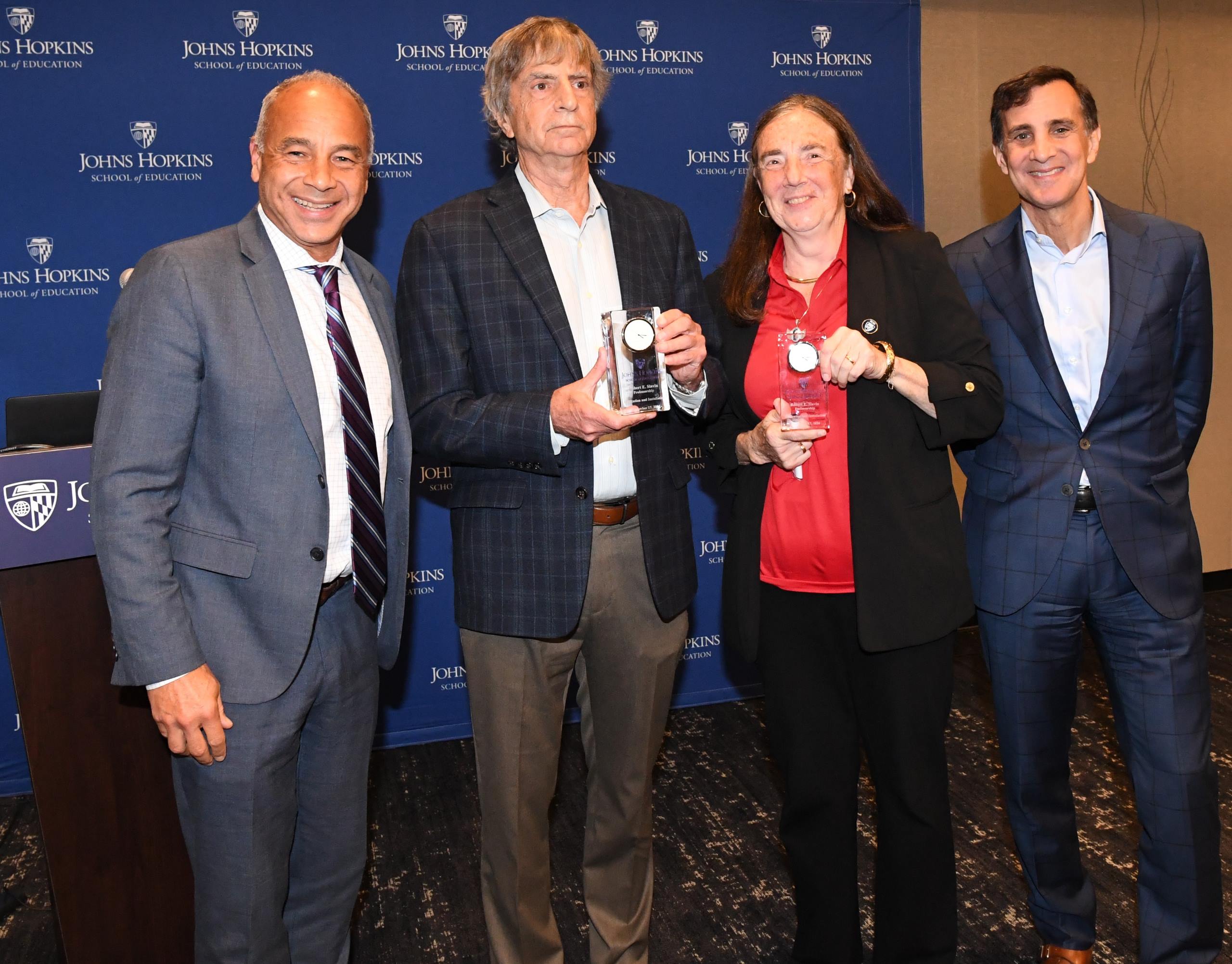Johns Hopkins UniversityEst. 1876
America’s First Research University
As a prominent education researcher, Robert “Bob” Slavin impacted countless young learners and school districts across the country. The inaugural Johns Hopkins School of Education Distinguished Professor and director of the school’s Center for Research and Reform in Education (CRRE), Slavin spent his entire career making schools better for kids, alongside his wife and research partner, Nancy Madden, PhD.
Together, Slavin, A&S ’75 (PhD), and Madden, a School of Education professor and CRRE colleague, collaborated on education initiatives, including literacy and improving education in underserved communities.

After Slavin’s passing in April 2021, Madden, along with family, friends, and other generous donors, honored his achievements and dedication to education reform by establishing the Robert E. Slavin Endowed Professorship — the second named professorship at the School of Education. The dedication and installation of the professorship took place in 2024 on Slavin’s birthday: September 17.
“The purpose of this professorship is to continue Bob’s research at Hopkins. The work that he started is still ongoing,” says Madden. “Bob’s goal was to increase the use of evidence of effectiveness as part of the decision-making process in the choices that schools make about how and what they teach.”
The Slavin Professorship inaugural recipient is Steven Ross, PhD, executive director at CRRE and a colleague and close friend of Slavin’s for nearly 40 years. Ross calls the appointment deeply personal.
“It’s a tribute to Bob, which makes the recognition even more special,” he says. “Professionally, it’s gratifying to have your work recognized. To be selected for an endowed position implies your work in research, service, and teaching is making important contributions to the field of education.”

Ross underscores how CRRE is extending Slavin’s work in two ways: conducting third-party, design-based evaluations of educational programs and disseminating useful information based on evidence. Slavin believed the field of education should be based in science.
One evidence-based initiative Slavin developed with CRRE is Evidence for ESSA, a free web-based resource that provides clear, defensible information on what education practices and models work best. Evidence for ESSA has proven to be a valuable tool for school leaders aiming to ensure that all students receive a high-quality education, in accordance with the Every Student Succeeds Act (ESSA), a bipartisan measure signed into law in 2015.
Ross explains how academic research can make a difference for teachers and students, especially for students in underserved communities with limited resources. He notes how Slavin made a tremendous impression in cooperative learning, a classroom dynamic that emphasizes small-group student work and active participation.
“Bob promoted the idea of providing practitioners, schools, school districts, students, and teachers with proven types of methods,” says Ross. “He bridged theory to practice.”
In one of the most renowned theory-to-practice examples in the field, Slavin and Madden launched Success for All in 1987. Combining proven strategies like cooperative learning, high expectations, and constant monitoring of progress, this comprehensive school model has been proven to increase achievement, particularly for disadvantaged students. In the 35 years that schools have implemented the Success for All program, more than two million children have been impacted.

Having shown throughout his career the paramount importance of reading skills in student achievement, in 2014 Slavin and his team began investigating to what extent poor reading skills among disadvantaged students might be due to poor vision. They conducted the Baltimore Reading and Eye Disease Study, leading to the launch of Vision for Baltimore, one of the nation’s largest public-private school-health collaborations, which has screened more than 80,000 students and provided eyeglasses to over 10,000 children.
“We set out to prove that all children could be successful in reading, because reading is the key to success in education throughout the world,” says Madden. “We have made real progress in demonstrating that. There’s a lot of satisfaction in that, but at the same time there’s more work to be done.”
Throughout Slavin’s career, he pushed the field of education forward.
“He was a person driven by making a difference,” says Ross. “He deeply cared about students and teachers.”
That same perspective is held by Madden and Ross — the importance of making an impact through education research. Thanks to donor support of School of Education professorships, advancement of research in the field of education at CRRE continues — benefiting the next generation of teachers and students.
“By helping to fund endowed chairs and professorships, donors are vitally investing in the future of our nation,” Ross says.
Topics: Alumni, Faculty and Staff, School of Education, Fuel Discovery